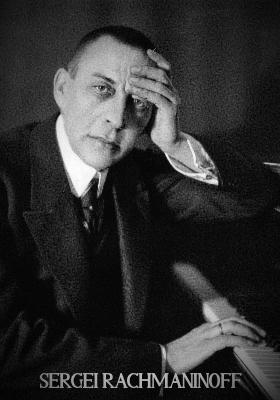Pianist Anna Fedorova and St. Gallen Symphony Orchestra presents
Conductor: Modestas Pitrena
Recording: Sunday the 2nd of February 2020, live in Het Concertgebouw in Amsterdam, The Netherlands.
Sergei Rachmaninoff:
Sergei Vasilyevich Rachmaninoff (1873-1943) was a Russian composer, virtuoso pianist, and conductor.
Rachmaninoff is widely considered one of the finest pianists of his day and, as a composer, one of the last great representatives of Romanticism in Russian classical music. Early influences of Tchaikovsky, Rimsky-Korsakov, and other Russian composers gave way to a thoroughly personal idiom notable for its song-like melodicism, expressiveness, dense contrapuntal textures, and rich orchestral colours.
The piano is featured prominently in Rachmaninoff's compositional output and he used his skills as a performer to fully explore the expressive and technical possibilities of the instrument.
Born into a musical family, Rachmaninoff began learning the piano at the age of four. He studied piano and composition at the Moscow Conservatory, from which he graduated in 1892, having already written several compositions. In 1897, following the disastrous premiere of his Symphony No. 1, Rachmaninoff entered a four-year depression and composed little, until supportive therapy allowed him to complete his well-received Piano Concerto No. 2 in 1901.
Rachmaninoff went on to become conductor of the Bolshoi Theatre from 1904–06, and relocated to Dresden, Germany, in 1906. He later embarked upon his first tour of the United States as a pianist in 1909.
After the Russian Revolution, Rachmaninoff and his family left Russia permanently, settling in New York in 1918. Following this, he spent most of his time touring as a pianist through the US and Europe, from 1932 onwards spending his summers at his villa in Switzerland.
During this time, Rachmaninoff's primary occupation was performing, and his compositional output decreased significantly, completing just six works after leaving Russia. By 1942, his declining health led him to move to Beverly Hills, California, where he died from melanoma in 1943.
Well hopefully he was an anticapitalist anyway, my favorite concerto here is No. 2, more melodic and straight music.
In music ı really love melodic structure and ı hate chaos and confusion, meaningless and senseless harmonic structures out of melodies don't mean anything to me at all.
There's nothing to be proud of as a capitalist unless you're a cruel and disgusting person.

No comments:
Post a Comment
Your comment is awaiting moderation.